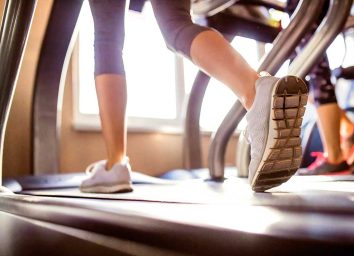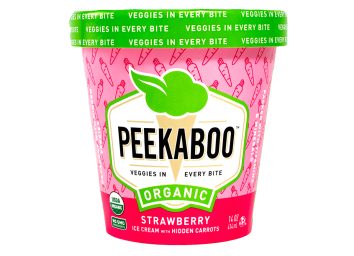15 Ways to Be Healthier This Year That Are So Easy You Wish You Knew About Them Sooner

In partnership with Wonderful Pistachios®
Research suggests that come February, four out of five Americans give up on their New Year’s resolutions. So what gives? The answer’s simple: Resolutions tend to be too lofty (“I’m getting a promotion”), too complicated (“I’m gonna redecorate my entire house”), or just too hard (“This is the year I get a six-pack”) to see through.
If you’re having trouble hitting your goals, the solution is to adopt easier—and therefore more effective and attainable—New Year’s resolutions. For some inspiration, we’ve cobbled together 15 of the easiest health-conscious resolutions you can make.
Keep healthier snacks on hand.
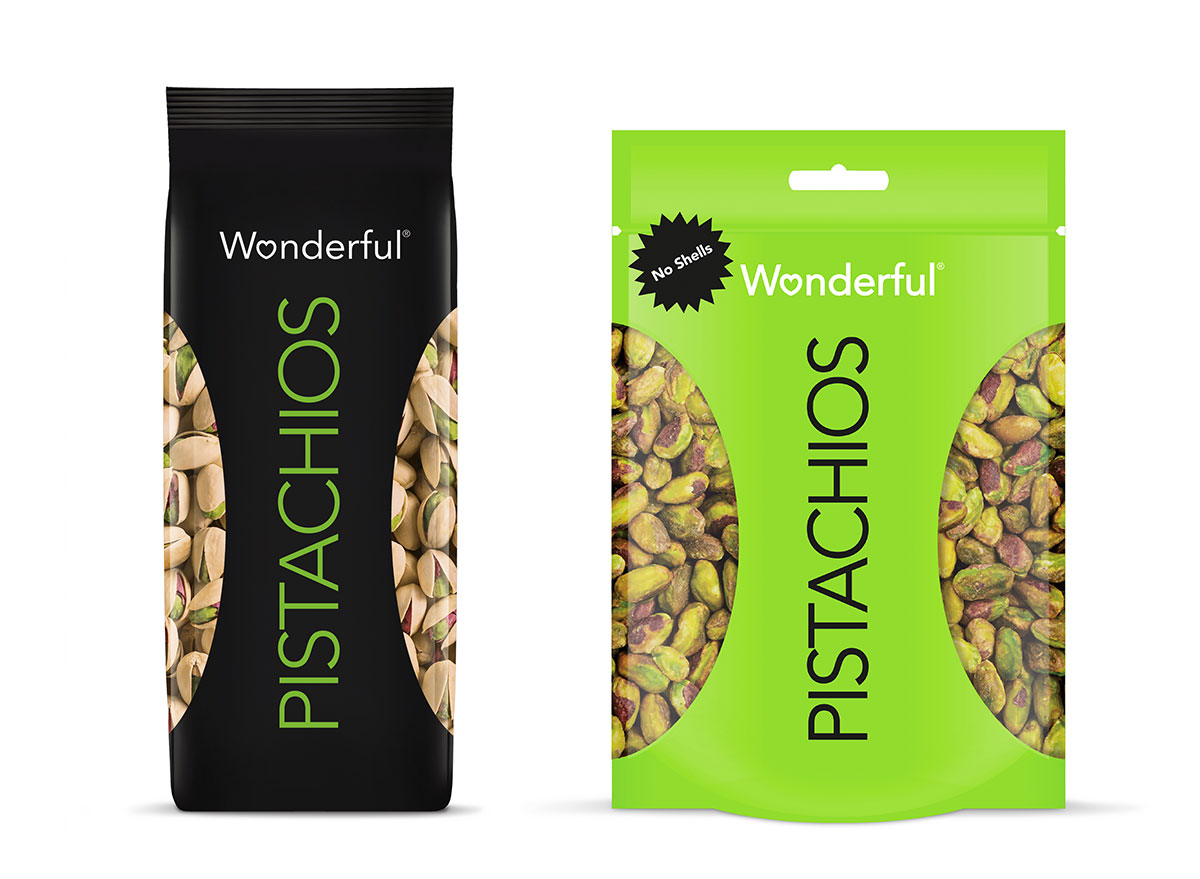
When hunger strikes, it’s all too easy to reach for a quick snack, like a leftover doughnut or a bag of potato chips. But such easy eatings are about as far away from the healthy aisle as you can get. If you’re looking for a satiating snack that’s also delicious, consider reaching for a bag of nuts—specifically, pistachios.
A serving of pistachios, like this offering from Wonderful Pistachios, has no added sugars, no cholesterol, and no trans fats. And best of all, there are 6 grams of plant-based protein per serving! Also, cracking the shells off your nuts slows down the eating process—and perhaps your overall calorie intake with it. (Though if you truly don’t have a second to spare, you could always pick up a no-shells option.)
Prioritize sleep.
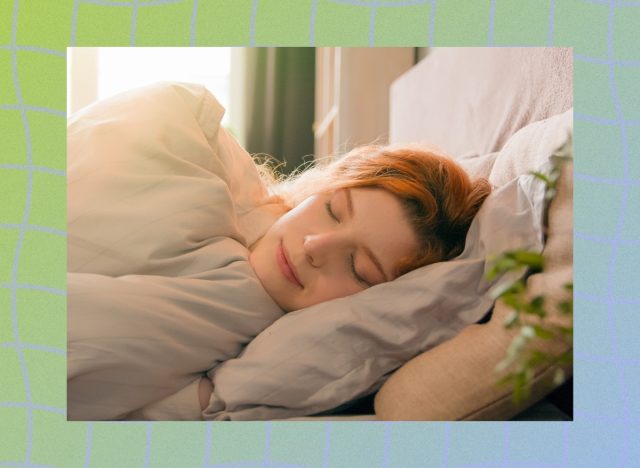
Between work, chores, and play, it’s all too easy to let sleep fall by the wayside. In fact, according to the Centers for Disease Control and Prevention (CDC), one in three Americans don’t get the doctor-recommended seven hours of sleep per night. This is bad for a myriad of reasons, both obvious (you’ll have less energy) and obscure (you’ll be more irritable), but the most serious is that a regular lack of sleep can increase your risk of developing Alzheimer’s.
“During deep sleep, excess amyloid protein—the protein associated with the formation of plaques in Alzheimer’s disease—is cleared from the brain,” says Marwan Sabbagh, MD, director of Cleveland Clinic Lou Ruvo Center for Brain Health.
Thankfully, prioritizing sleep can be easy with some simple tricks. Sabbagh recommends the four tips below so you’ll be on track for seven hours of sleep:
- Go to bed and wake up at the same time every night (yes, even on the weekends). It’ll make it easier to rise and shine when Mondays roll around.
- Exercise often, but never within three hours before you hit the hay.
- Avoid caffeine late in the day.
- Don’t eat a large meal before bed, and remember that alcohol can disrupt sleep.
Keep a food diary.

Pop quiz time: What’d you eat for lunch three days ago? How about dinner? A midnight snack? If the answer to all of those is “No clue,” it might be time to start a food diary. Most people can’t recall days-ago meals—and that’s why it’s useful to write your meals down. It can also help you recognize any recurring instances of empty-calorie foods, which are foods that have calories with no nutritional value.
It could also help you uncover a pattern of food intolerances. According to Vincent Esposito, DC, the owner of Insider Out Health and Wellness, it takes anywhere from 24 to 72 hours for symptoms of a food sensitivity to show up. Esposito says writing down everything you eat “gives your healthcare provider useful information they can use to alter and customize treatment plans to get you the best results possible.”
Stretch at work.
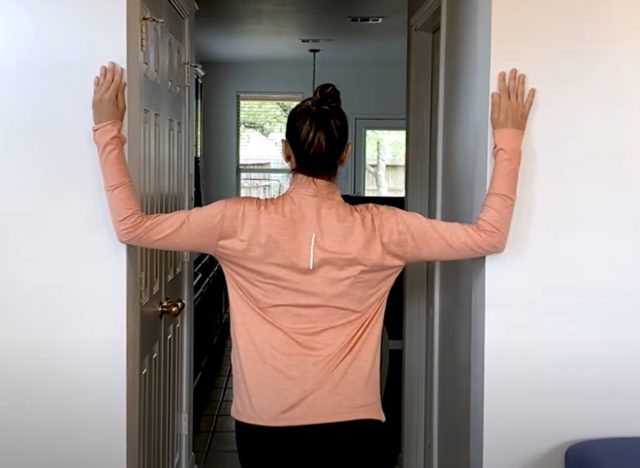
“I don’t have time in my schedule for a yoga class.” “I don’t feel like paying for a gym membership.” “I’m too tired to take time to stretch.”
Whatever your excuse is for avoiding regular stretch sessions, it’s probably not good enough. You can reap all of the benefits of stretching by just dedicating a few minutes each day to the practice. “Stretching prevents muscles from becoming tight after prolonged sitting at the computer, which will reduce muscle spasms and help prevent back pain,” says Allen Conrad, DC, CSCS, of Montgomery Country Chiropractic Center in North Wales, Pennsylvania.
Can’t find the time? Just do it during your lunch break! Even just a few minutes will work wonders, says Conrad.
Keep a glass of water by your bed.

Staying hydrated and drinking plenty of water is important and can help you feel great. The easiest way to remind yourself to drink water throughout the day is to invest in a high-quality water bottle to help you hit your daily water goals.
And remember: your body doesn’t just get dehydrated during the day. According to Monica Straith, an ACE-certified personal trainer and the fitness lead at AlgaeCal, your body dehydrates while you sleep. Think about it: If you’re hitting the doctor-recommended amount of nightly sleep, then you’re going at least seven hours without water. How parched would you be if you went seven hours without a single sip during the day? To beat back these early-morning feelings of thirst, just keep a glass of water by your bed—and don’t forget to chug it when you wake up.
Limit your social media consumption.

It’s no secret that social media is a major stressor. According to a 2014 study published in the Proceedings of the National Academy of Sciences, stress as a result of social media can spread like wildfire. So cut down on your use. If you have an iPhone, use Screen Time’s App Limits to set time limits on social media apps. You can also download a productivity browser plug-in that blocks your access to social media while you’re working.
Eat vegetarian at least once a week.
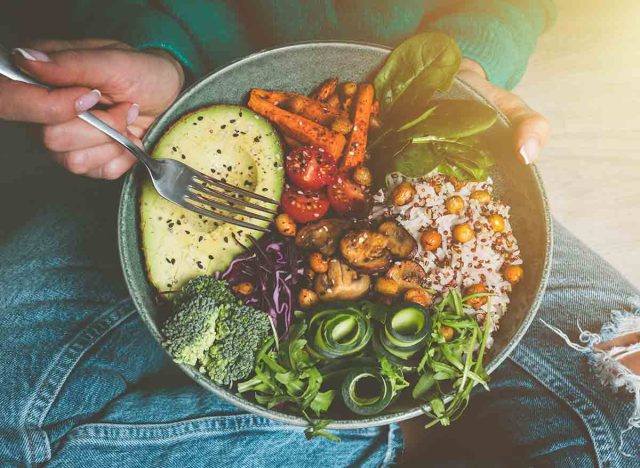
Yes, meat is high in protein, which is great for boosting energy levels and building muscle. But people tend to eat too much of it—and not enough plants. A plant-based diet has been linked to a variety of health benefits, and that’s why eating less meat and eating more greens is one of the best things you can do for your health (to say nothing of the positive effects such a move has for the environment).
Going cold turkey on your meat-eating habits is a lofty goal. But eating vegetarian just one day a week? Easy. Eat veggie burgers instead of beef ones. Get falafel on your salads instead of chicken. Order peanut avocado rolls instead of spicy tuna ones. Snack on pistachios instead of jerky. Pick a day—we recommend Mondays so you can get some food inspiration from the #MeatlessMonday movement.
Take your coffee black.

A cup of coffee with all the fixings (like sugar, creamer/milk, or syrups) can easily add up to more than 100 calories. On the other hand, a cup of black coffee has just 5 calories. You don’t need a nutritionist to tell you which is the healthier option. In a 2017 Public Health study, researchers found that those who take their coffee black consume about 69 fewer calories than those who add sweeteners and creamers—that adds up to an extra 500 calories a week. Plus, according to a study in the Journal of Conservative Dentistry, drinking black coffee can drastically reduce your risk of developing cavities by 32 percent. Sure, you might miss your favorite coffee add-ins at first, but when you make the switch to black coffee, you’ll get the same amount of caffeine and make major strides in your overall health.
Stop eating at your desk.

“Many of us have become accustomed to eating at our desk, in front of the TV, or even in the car,” says Erika Fox, RD, the community manager at 310Nutrition. That’s why she recommends eating every meal as, well, a meal—or at the very least not multitasking while you wolf down some food. As Fox points out, one 2013 study published in The American Journal of Clinical Nutrition revealed that eating meals while distracted not only results in eating more calories during that meal, but it also increases your likelihood of eating more throughout the rest of the day. So, when you get hungry, give yourself 20 or 30 minutes, get some food, sit down, and actually enjoy it.
Actually use your vacation days.

Recent research suggests that more than half of all Americans haven’t taken a vacation in the past year. However, stepping away from the grind is one of the best things you can do for your mental health. Taking a vacation—which is broadly defined as a trip for leisure that lasts at least a week and is 100 miles or more away from home—can help reduce stress levels, lower blood pressure, and increase your longevity.
Implement stress-busting rules into your life.

We could all chill out a little bit more. Though it might sound counterintuitive, the easiest way to relax is to implement some structure into your life. By sticking to this productivity “rule” of putting more structure in your life, you’ll find that you have no room in your schedule to stress out.
One extremely easy one to try is the “Rule of Five.” Here’s how it works: If you think about doing something and it’ll take five minutes or less, just do it. Once you get it off your plate, you won’t have to stress about it for a second.
Establish a no-drinking day.

Alcohol is loaded with empty calories. So that beer you just knocked back? That’s 150 calories of stuff that does nothing beneficial for your health. Instead of attempting a Dry January as a one-and-done event, pick one day a week when you don’t drink at all and stick to it week after week.
Yes, you can eat carbs and fat.
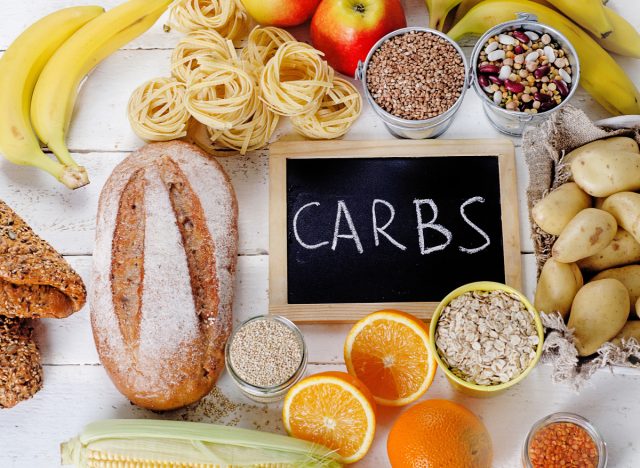
Carbs are often portrayed as the bad guy, the single meanest dietary villain that wreaks havoc on your waistline and sends your blood sugar levels on a roller coaster ride. As such, many diets recommend that you essentially cut them out completely. However, if you really want to live a healthy lifestyle, you shouldn’t consider doing that.
“Carbs are critical for the body, providing the most efficient form of fuel, especially for exercise,” says Rachel Fine, RD, the owner of To The Pointe Nutrition, a New York City-based nutrition firm. And don’t go cutting out fat either. For the good kind of healthy fat, reach for a snack like Wonderful Pistachios. The combination of fat, protein, and fiber may help you feel full between meals.
The key to a healthy diet is simple: eat everything in moderation. It’s not necessary to restrict entire food groups if it’s not practical. Food should be nourishing—not a nuisance.
Sign up for an overpriced gym.

One of the most common New Year’s resolutions is no surprise: “I’m going to work out more this year.” It’s a well-known fact that gyms make their money off of this idea: people sign up in January, quit going by February, and never actually cancel their membership, so the gym continues to rake in money throughout the rest of the year.
If you really want to get the most bang for your buck, you might need to spend more bucks on your gym (if you have the means to do so). Sign up for a fancy gym like Equinox or a boutique gym in your area, and your membership can easily clear $200 a month—not to mention high initiation fees—and you’ll feel guilty if you skip just a day. Imagine how bad you’ll feel for skipping a week. At that price, you wouldn’t even dream of skipping a whole month. Plus, these higher-end places often come with amenities (think: cooling towels, spa-level showers, and free toiletries) that’ll make you excited to work out.
Get a standing desk.

“Sitting is the new smoking,” they say. Well, “they” aren’t exactly wrong. Spending eight hours a day (or more!) hunched over a keyboard can wreak havoc on your spine. So pick up a standing desk or find a space in your office where you can grab your laptop and go stand up for a bit. (Pro tip: check the kitchen.)
Start by dedicating an hour total over the course of a given day to standing—this could mean standing for about seven-and-a-half minutes out of each hour. Then slowly, over the course of the year, work your way up to half the day. That may sound daunting, but it’s way easier than you think. You’ll never know unless you try! Amazon has some solid entry-level options that you can put right on top of your current stationary desk for under $100.
